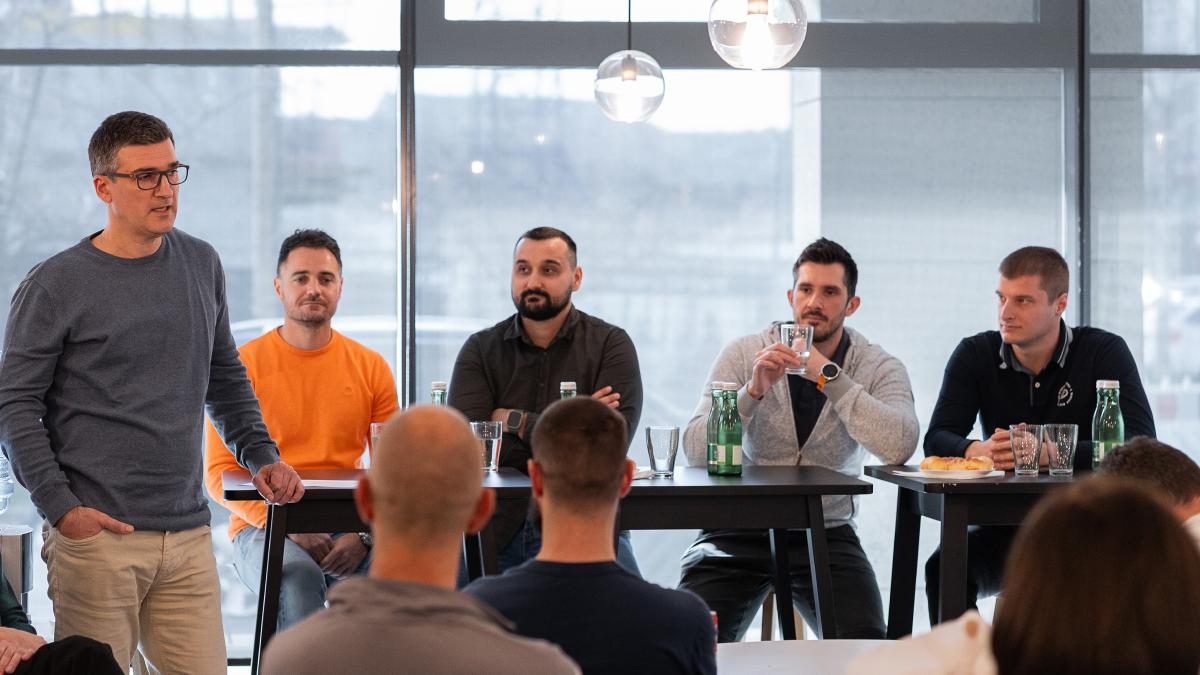Serbia is one of the Balkans region’s top performers — it now boasts the fastest-growing ICT industry in the Western Balkans region and a strong ICT talent pool. Accounting for 10 percent of its GDP, Serbia’s Information and communication technology (ICT) sector ranks among the top four export sectors alongside steel, automobiles, and agriculture.
As Serbia emerges as a strong player in the ICT space, the country (and its organizations) has attracted the attention of American business students interested in learning more about the region and the future of Serbia’s ICT industry. Already a global entity, HTEC’s acquisition of Momentum Design Lab, a prestigious product design studio in Silicon Valley, and SYRMIA, an embedded software engineering company based in Serbia, underscores the sector’s swift expansion and global recognition. The two acquisitions have accelerated the company’s already impressive growth and strongly influenced the Serbian ICT scene from a global level.
To help shape future business leaders and build connections that foster knowledge exchange and accelerate technological advancements, HTEC recently hosted 33 MBA students from Stanford University, one of the most prestigious programs in the world. We introduced the students to HTEC’s engineering and business development capabilities, mindset, culture, and core values.
Blending academic and real-world experiences
During the visit, students learned about real-life technological project challenges and solutions that companies across industries and domains, from retail and automotive to robotics and logistics, face on their digitalization journey. This will ultimately empower students to bridge the gap between their academic and real-world experiences and advance their practical skills for future career growth.
The students also learned about HTEC’s approach to mergers and acquisitions and participated in an open discussion about Serbia’s evolving startup ecosystem, allowing them to gain a better understanding of the region and the role it will play in engineering future innovations.
Mile Pajovic, the MBA candidate, who organized the Stanford MBA students’ visit, shared his impressions:
“One of the goals of our visit was to build bridges between Stanford and the Balkan region. As a company headquartered in San Francisco with roots in the Balkans, HTEC seemed like a perfect partner. Also, Stanford and HTEC share the same DNA, including world-class engineering talent and a hunger for innovation,” says Mile.
Mile said the HTEC team organized a thoughtful “mini-MBA program,” making students feel right at home in HTEC’s beautiful office space.
A fireside chat with Darko Todorovic and Kostas Bimpikis

To help students gain a better understanding of HTEC’s expertise and core capabilities, we organized a fireside chat with Prof. Kostas Bimpikis, professor of operations, information, and technology at Stanford Graduate School of Business, and Darko Todorovic, HTEC’s vice president of engineering and delivery.
Besides being a professor at Stanford, Kostas has been an Amazon Scholar since 2020 where his responsibilities revolve around last-mile delivery and logistics. His outstanding experience in retail and logistics, with a focus on optimization, analytics, AI (artificial intelligence), and ML (machine learning), and Darko’s rich teaching background in the Control Systems department and active involvement in the robotics laboratory at the University of Nis, along with his engineering expertise in building innovative solutions, sparked many discussion topics during the chat.
The two thought leaders explored the most frequent challenges they have faced while working on projects across industries, from autonomous driving and last-mile delivery to generative AI and warehouse inventory optimization, diving deeper into the trends and complexities around navigating last-mile delivery, the last leg of the journey in the supply chain management and transportation planning, which includes the movement of goods from a transportation hub to their final destination— typically a customer’s home address.
They also reflected on the challenges of building more cohesive relationships between universities and software engineering companies, especially in Europe. They agreed that creating a stronger connection between these entities would allow students to strengthen their theoretical and practical knowledge, empowering them to contribute to new transformative solutions for the companies of tomorrow.
“You don’t just need engineering talent. You need people who understand business to be able to build a strategy that works. In my experience, the real hurdles emerge not in problem-solving but in accurately defining the problem, its objectives, and execution constraints. Our focus is to nurture managerial skills and effective communication with technical teams in the Stanford curriculum and enable our students to integrate these skills seamlessly,” says Kosta.
Darko added that the ecosystem is slowly evolving, emphasizing that companies like HTEC are already helping to establish more robust collaboration between universities and software engineering firms.
“We have several Ph.D. students working on HTEC projects internally, and we see the positive impact this has on their skills and the final products and solutions we present to our clients. These are small steps, but each step we take reveals a new horizon,” says Darko.
Darko also reflected on HTEC’s core strengths and opportunities for further improvement.
“We have engineers with 15 years of experience solving different tech problems and a deep understanding of the market and business. We strive to leverage their collective knowledge to help clients solve complex challenges and see beyond what’s possible to unlock new business opportunities.”
The MBA students actively participated in the discussion, showing expertise and interest in the presented topics considering their role in bridging the gap between business and engineering delivery and how future innovation will help solve some of the current industry challenges.
Panel discussion: Building a Serbian startup ecosystem

The Stanford students also had a chance to attend a panel discussion about Serbian startup evolution through expansion, significant regional and international exposure, and increased investments. The panel also looked at different approaches to startup ecosystem growth.
During this panel, Nebojsa Bjelotomic, CEO of Digitalna Srbija initiative, Davor Sakač, director at TS Ventures Fund, and Nebojsa Sabovic, director and CTO of Fuller Vision, agreed that with the increasing number of startups in Serbia, there is a pressing need to provide these businesses with financial support to thrive globally.
While discussing the essential factors for advancing the Serbian startup ecosystem, Bjelotomić explained that successful startups need experts in economics, business, and management to attract a broader client base. This is where he believes Stanford students’ academic excellence, deep knowledge of engineering, computer science, humanities, and business, and strong entrepreneurial spirit could contribute most significantly.
Empowering tomorrow’s business leaders

The students’ visit to HTEC’s offices was mutually beneficial. They gained insights into HTEC’s technical projects and capabilities, helping them to strengthen the link between theory and practice and prepare for future business endeavors.
“It is safe to say that this meeting will lead to many professional and social reconnections in the future. I want to thank the entire HTEC team and Katarina, who helped organize the entire visit, for hosting us and putting on a memorable event,” says Mile.
For HTEC, the visit represented a crucial connection point with a world-renowned institution and its students, allowing our organization to leverage its expertise for future collaborations, knowledge sharing, and joint efforts on projects.
We want to thank everyone for visiting HTEC and wish everyone great success on their professional journeys!
Discover how we’re pioneering industry-disruptive innovation in Serbia and worldwide with HTEC services.






